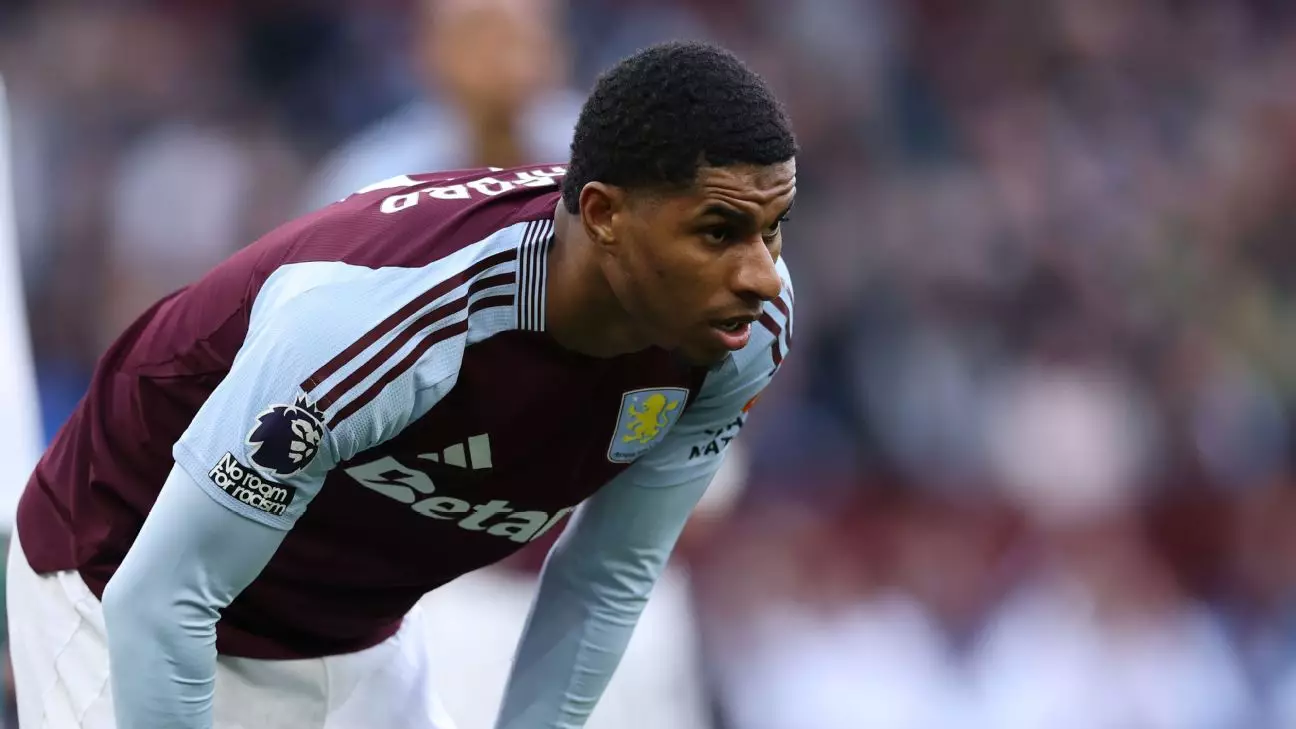Marcus Rashford, once a beacon of hope for Manchester United and the England national team, finds himself at a pivotal juncture in his career. After stepping onto the pitch at the Etihad Stadium for years as a vibrant young attacker, he is now experiencing life as an Aston Villa player. His transition follows a turbulent period filled with highs and lows—a contrast as stark as the thunderous cheers of the fans at Old Trafford with the current quietude surrounding his career. Having joined Aston Villa on a loan agreement until the end of the season, Rashford stands at the threshold of numerous decisions—each carrying its own weight and implications.
While recall to the England squad suggests that he retains value, his inconsistent performance record raises questions about his commitment and focus. Having delivered three goals and five assists in only 16 appearances this season, he must now prove that his talent can surface amidst the chaos that has often clouded his career trajectory.
From Star to Uncertainty
The emotional rollercoaster that has defined Rashford’s career is intertwined with the fortunes of Manchester United, a club armed with rich history but facing challenges of its own. Rashford’s exploits in the Manchester derby, including unforgettable moments such as nutmegging defender Martin Demichelis in 2016 and executing a nail-biting penalty kick, put him on the map as one of the club’s brightest stars. However, the glow of these memories dims in the face of a career marred by questionable decisions and fluctuating focus.
To explore how he landed at Aston Villa, one must unearth layers of discipline issues, personal choices, and managerial expectations. Rashford’s past indicates talent, yet, his connection to the club’s ethos has noticeably waned, especially under new management. In stark contrast to the training dedication displayed after his previous summer away at Nike’s performance center, recent antics—such as an unauthorized night on the town prior to a training session—signal a worrying lack of responsibility.
The Influence of Management Changes
The appointment of new manager Ruben Amorim brought with it a fresh slate and high hopes for revitalization. However, Rashford’s approach has reportedly raised eyebrows among the coaching staff. Amorim entered with knowledge of the pressures surrounding Rashford, only to be met with performance inconsistencies that irked him. Despite an impressive early showing in Amorim’s debut match as boss, Rashford’s subsequent behavior and disciplinary concerns have led to his omission from critical fixtures, casting a long shadow over his future at United.
The crux of Rashford’s current standing centers not just on performance, but also on the intertwined dynamics of personal accountability and professional responsibility. Taking an impromptu holiday while being expected to show commitment is a move that suggests a deeper disconnect—a nuanced dance between the excesses of fame and the rigorous demands of professional football.
The Financial Quandary
Financial discussions also loom largely over Rashford’s future. With a significant salary of around £350,000-a-week, the tension is palpable for both Aston Villa and Manchester United. For Villa, a permanent signing would require a strategic balance of commitment without straining their financial framework. Such a situation isn’t just about money; it encapsulates the risks of investing in a player whose trajectory seems momentarily stalled.
It is essential to underscore the tricky negotiation landscape. Reports indicate that both clubs are navigating delicate waters as they consider various options, from renegotiating the terms of a loan to exploring possibilities for a permanent transfer. The potential for another loan move remains a possibility, but its success hinges on the brinkmanship and financial acumen of the involved parties.
Rashford’s Personal Struggles and Redemption
Rashford’s journey thus far can be viewed through a lens of unrelenting scrutiny, especially when compared to contemporaries who have managed to adapt and thrive. This contrast begs the question: can he re-establish his footing? Within the walls of Villa Park, Rashford has shown glimpses of commitment, taking additional training sessions even while conceding playing time. Yet that may not be enough to combat the perception of fragility in his character and consistency.
While potential suitors like Borussia Dortmund, AC Milan, and even Barcelona have circled, the realities of contractual obligations and club commitments present complexities that cannot be glossed over. Many observers are left wondering whether Rashford can silence his critics and emerge as the player people believe he can be, with each new opportunity fraught with both peril and promise.
As he steps onto the pitch again for a Manchester derby, albeit in new colors, the key to his rejuvenation may well lie in a renewed sense of purpose—one that distances himself from distractions and fosters an unyielding commitment to reclaiming his place among the elite in football. In doing so, Marcus Rashford may yet fulfill the extraordinary potential that first captivated the hearts of fans worldwide.

